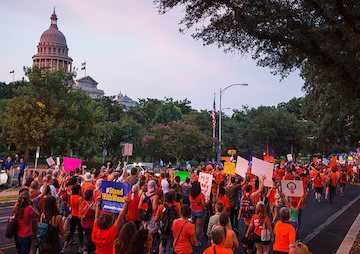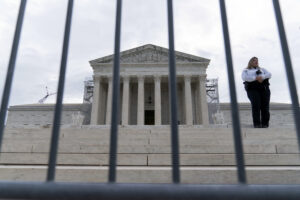Supreme Court Agrees to Hear Biggest Abortion Rights Case in Two Decades
Justices agreed Friday to review a Texas law that could close three-fourths of the state’s abortion clinics. The law, known as HB2, passed in 2013 and has led to the closure of more than half the state's clinics. A protest rally against Texas' HB2 law. (mirsasha / CC BY-SA 2.0)
A protest rally against Texas' HB2 law. (mirsasha / CC BY-SA 2.0)
The Supreme Court on Friday agreed to review a Texas law that could close three-fourths of the state’s abortion clinics. It has the potential to become the most significant case on abortion rights the court has heard in 23 years.
The Texas law regulates abortion providers in various ways. For example, physicians performing abortions at specific clinics must hold admitting privileges at a hospital within 30 miles, and clinics must meet building standards for “ambulatory surgical clinics,” which are too costly for most abortion providers to meet.
The law, known as HB2, passed in 2013 and has led to the closure of more than half of Texas’ abortion clinics. Of the hundreds of new abortion restrictions lawmakers have passed since 2010, few have proved so consequential to abortion access within a single state. “Before the law began to take effect,” The Guardian reports, “Texas had 41 abortion clinics. A provision requiring abortion providers to have admitting privileges with a hospital cut that number in half, and there are 18 clinics today. A second provision of the law, which has been blocked on and off for two years, would further slash the number of providers to nine or 10.”
The last time the nine justices of the Supreme Court ruled on a major abortion-related issue was in 2007, when they ruled 5-4 to uphold a federal law banning a late-term abortion procedure.
From The Guardian:
“This law is causing real harm to women across the state of Texas,” said Amy Hagstrom Miller, the founder of Whole Woman’s Health, a network of abortion clinics with four locations in Texas. “We have been fighting this draconian law since 2013 … I am hopeful that the supreme court will uphold the rights that have been in place for four decades and reaffirm that every woman should be able to make her own decision about continuing or ending a pregnancy.”
Whole Woman’s Health is one of several providers suing to overturn the law.
The stakes of the case are enormous. Texas abortion providers are challenging the supreme court to declare how far states can go in restricting abortion ostensibly to protect women’s health, which the court has never fully clarified.
In a 1992 case, Planned Parenthood v Casey, the supreme court gave states the right to restrict abortion in the interest of the woman’s health as long as the restriction is not an “undue burden”. But the high court has never defined what the term means.
Abortion foes contend that a law is not an undue burden unless it takes a major toll on abortion access, while abortion rights advocates argue that a law is an undue burden if it serves no actual medical purpose. Which argument prevails could make the difference between a tidal wave of anti-abortion bills and a trickle. Conservative state lawmakers have enacted hundreds of new abortion restrictions in the past five years that mainstream medical organizations say carry no real health benefits.
A sweeping opinion on the Texas law would have immediate consequences for abortion clinics in seven other states. Alabama, Kansas, Louisiana, Mississippi, Oklahoma, Tennessee and Wisconsin have all passed similar laws, now mired in legal battles, which could close a combined 20 abortion clinics. Several of those states would be left with just one or two abortion providers.
Read more here. Read facts on major U.S. Supreme Court rulings on abortion rights here.
–Posted by Roisin Davis
Your support matters…Independent journalism is under threat and overshadowed by heavily funded mainstream media.
You can help level the playing field. Become a member.
Your tax-deductible contribution keeps us digging beneath the headlines to give you thought-provoking, investigative reporting and analysis that unearths what's really happening- without compromise.
Give today to support our courageous, independent journalists.






You need to be a supporter to comment.
There are currently no responses to this article.
Be the first to respond.